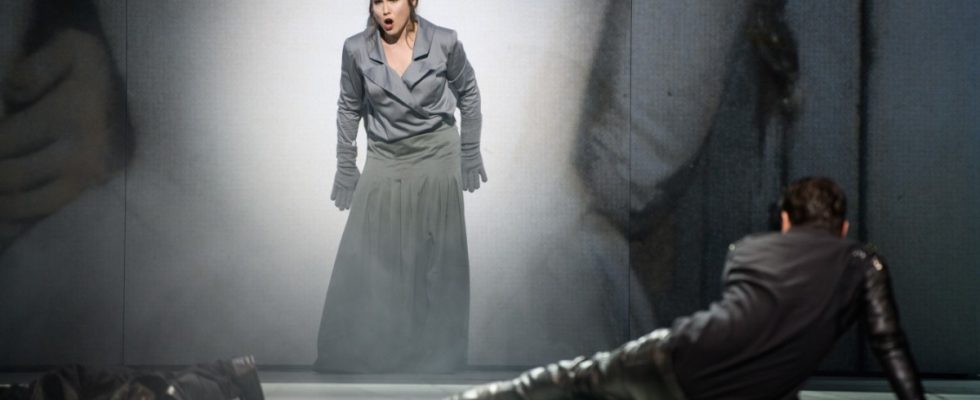Grand opera is when three out of five main characters are dead at the end. Tragically, in Giuseppe Verdi’s “Luisa Miller” the two fathers survive: Count von Walter, who wanted to force his son Rodolfo into a civil marriage, and Miller, whose daughter Luisa takes Rodolfo to her grave. Just like in the original play, Schiller’s “Kabale und Liebe”. The new production at the Gärtnerplatztheater, however, has significantly more corpses: At the beginning and end, the entire choir rotates stretched out on the revolving stage.
How director Torsten Fischer tends towards a certain over-explicitness, which restricts the characters in terms of possible ambivalence: Walter (Inho Jeong) wears a uniform that – Attention, evil! – reminiscent of an SS officer in the first act, of a Soviet commander in the second and third; his Adlatus Wurm (Timos Sirlantzis) struggles through in a leather coat with the nasty grin of the Joker; the court shows itself – attention, decadence! – in glitter dress and tuxedo. As part of the blood oath, Walter and Wurm slash their palms with a razor while Miller (Matija Meić) defends his daughter Luisa (Jennifer O’Loughlin) with the crucifix and the toughness of a construction worker.
So it’s fitting that Anthony Bramall’s last premiere as chief conductor of the Gärtnerplatztheater was robust. Bramall puts pressure on tempo and volume, hardly letting the music of the young Verdi bounce. Even the stage design – composed of three rotating portraits of an innocent white lady – does not seem to want to be left behind: the fog machines hiss to Luisa’s solo, and the a cappella quartet, one of the composer’s greatest ideas, is quickly used for the conversion .
All this is at the expense of the – Italian singing – ensemble, as if Verdi’s roles were not difficult enough to cast in the present. Jennifer O’Loughlin masters the balancing act of coloratura and dramatic aplomb, which is typical for the younger Verdi, and even lets Luisa soar toward death with an angelic soprano. Jenish Ysmanov beguiles in Rodolfo’s aria “Quando le sere al placido” with enamel and piano colors, but can hardly develop a coherent portrait. Because the men generally outdo each other with powerhouses, often singing at the stop. Even the otherwise wonderfully balmy Anna Agathonos overdrives as Federica. Not nice, but acknowledged by the audience with similarly powerful cheers.
How much opera should the Gärtnerplatztheater do?
How much the Gärtnerplatztheater should devote itself to grand opera has always been a crucial question, especially in view of the competition with the State Opera. Even if good productions can result in individual cases, such as the French-language “Werther”, which has two members from the house ensemble. Against this background, what artistic director Josef E. Köpplinger announced a few days before the latest premiere for the 2023/24 season can be interpreted as a return to core business: a concentration on German light opera, operetta and musicals.
Köpplinger himself will stage “The Magic Flute” at the opening of the season (which he only did two and a half years ago in Dresden), Bernd Mottl, who has tried his hand at operettas, the “Bird Seller”, Brigitte Fassbaender “The Merry Weiber of Windsor”. It is astonishing that there is no baroque opera among them. Finally, Rubén Dubrovsky, the new chief conductor, who has already been partially active in the current season, brings with him a wealth of experience with the 17th and 18th centuries. For the time being, however, he is only allowed to perform Handel’s oratorio “Il trionfo del Tempo e del Disinganno” in concert and otherwise wants to devote himself to folk music influences on art music in concerts. The ballet takes on more serious themes with a new choreography of “Peer Gynt” (Karl Alfred Schreiner) and “Troy” (Andonis Foniadakis), the latter of which is reminiscent of a three thousand year old war.
For Köpplinger, this was a decision against the background of a multi-crisis epoch: “The cheerful is getting more popular, the audience needs more entertainment.” He feels the “longing for a story played” and “aversion to overinterpretation”. At the same time, he cannot complain about a lack of capacity utilization in post-corona times. Subscriptions are growing by five percent, musical and operetta occupancy rates are 90 and 91 percent, respectively, and opera is at least 84 percent. In the future, grand opera will remain reserved for the repertoire, with just a few top titles.
The novelties are in the entertainment genres: Thomas Pigor, who has already given the house a long-running hit with “Three Men in the Snow”, is presented with “Oh! Oh! Amelio!” write a new operetta. After all, they are “one of the last repertoire houses for this genre,” says Köpplinger. The subject about a travesty artist can also be seen as a further offer for the queer community in the district.
And then there is the offer for everyone who has never been there: Köpplinger managed to secure the Munich premiere of “Les Misérables”, with 22 – that much is foreseeable – sold out performances. Starting in the coming season, the company wants to train young people for these genres in-house, in its own opera studio with a focus on opera and operetta.
Conclusion: In the future, the Gärtnerplatztheater will set itself apart even more demonstratively from the State Opera and, at the same time, will increasingly compete with the Deutsches Theater.

